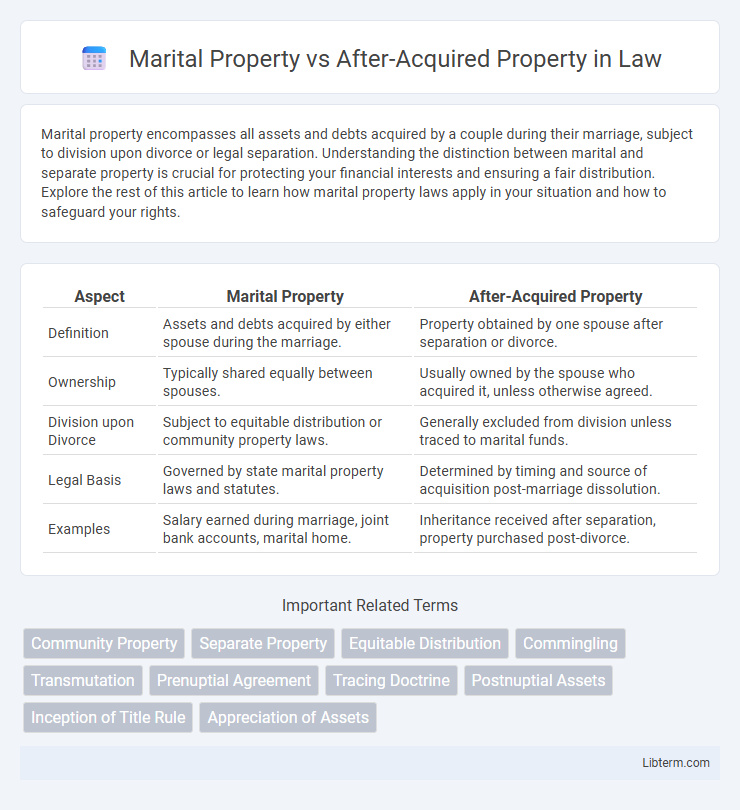Marital property encompasses all assets and debts acquired by a couple during their marriage, subject to division upon divorce or legal separation. Understanding the distinction between marital and separate property is crucial for protecting your financial interests and ensuring a fair distribution. Explore the rest of this article to learn how marital property laws apply in your situation and how to safeguard your rights.
Table of Comparison
| Aspect | Marital Property | After-Acquired Property |
|---|---|---|
| Definition | Assets and debts acquired by either spouse during the marriage. | Property obtained by one spouse after separation or divorce. |
| Ownership | Typically shared equally between spouses. | Usually owned by the spouse who acquired it, unless otherwise agreed. |
| Division upon Divorce | Subject to equitable distribution or community property laws. | Generally excluded from division unless traced to marital funds. |
| Legal Basis | Governed by state marital property laws and statutes. | Determined by timing and source of acquisition post-marriage dissolution. |
| Examples | Salary earned during marriage, joint bank accounts, marital home. | Inheritance received after separation, property purchased post-divorce. |
Understanding Marital Property
Marital property consists of assets and debts acquired by either spouse during the course of the marriage, regardless of whose name is on the title, and is subject to equitable distribution upon divorce. Separate property, including after-acquired property obtained by a spouse after separation or divorce, typically remains the individual asset of that spouse and is not divided. Understanding the distinction between marital and after-acquired property is crucial for accurately determining legal rights and financial responsibilities during property division proceedings.
Defining After-Acquired Property
After-acquired property refers to assets obtained by either spouse during the marriage but after the establishment of the initial marital property pool. This type of property may be subject to division in divorce depending on jurisdictional laws and whether the property was acquired with marital funds or efforts. Clarifying the distinction between marital property and after-acquired property is essential for accurate asset classification and equitable distribution.
Key Legal Distinctions
Marital property includes assets acquired by either spouse during the marriage, regardless of whose name is on the title, while after-acquired property refers to assets obtained after a separation or divorce filing. Key legal distinctions focus on the timing of acquisition and the intent behind ownership, with marital property typically subject to equitable distribution and after-acquired property often excluded from division. Courts evaluate whether after-acquired assets are directly tied to marital funds or efforts to determine their classification.
How Property Is Classified in Marriage
Marital property includes assets and debts acquired by either spouse during the marriage, regardless of whose name is on the title, and is subject to division upon divorce or separation. After-acquired property refers to assets obtained after the marriage but before separation, often considered part of marital property if acquired with marital funds or effort. Classification depends on jurisdiction, with community property states treating most property acquired during marriage as jointly owned, while equitable distribution states divide assets based on fairness and contribution.
Impact on Divorce Settlements
Marital property includes assets and debts acquired during the marriage, typically subject to equitable division in divorce settlements, directly affecting the financial outcomes for both parties. After-acquired property, obtained after separation but before the final divorce decree, may or may not be considered marital property depending on state laws, influencing the allocation of assets. Courts analyze the timing and nature of property acquisition to determine its classification, thereby shaping the distribution of resources and long-term financial obligations in divorce cases.
State Laws and Variations
State laws vary significantly in defining marital property and after-acquired property, impacting asset division during divorce proceedings. Community property states generally consider all property acquired during marriage as marital property, while equitable distribution states evaluate factors such as contribution and timing. Variations exist in treatment of after-acquired property, with some states attributing it entirely to one spouse, and others integrating it into the marital estate depending on circumstances.
Managing After-Acquired Assets
Managing after-acquired property requires clear tracking and documentation to differentiate these assets from marital property, especially in community property states. After-acquired assets generally include any property obtained during the marriage but after a separation or through inheritance, gifts, or earnings. Proper management and legal counsel ensure these assets are appropriately classified, preventing disputes in divorce proceedings or estate settlements.
Protecting Individual Property Rights
Marital property includes assets acquired during marriage and is subject to division upon divorce, while after-acquired property refers to assets obtained after separation but before divorce is finalized. Protecting individual property rights requires clear legal agreements, such as prenuptial or postnuptial contracts, to explicitly define ownership and separate individual assets from marital property. Courts often consider the timing of acquisition and contribution to asset growth when determining property division to safeguard individual interests.
Common Disputes and Resolutions
Disputes over marital property versus after-acquired property often arise in divorce cases, particularly regarding assets obtained during the marriage but titled individually. Courts typically resolve these conflicts by examining state-specific community property or equitable distribution laws, determining if after-acquired property is considered separate or marital based on commingling and contribution factors. Mediation and forensic accounting frequently assist in clarifying ownership and ensuring fair division of contested assets.
Practical Tips for Couples
Marital property generally includes assets acquired during the marriage, while after-acquired property refers to assets obtained after separation but before divorce. Couples should keep detailed records of asset acquisition dates and consult legal counsel to classify property accurately according to state laws. Using prenuptial or postnuptial agreements can clarify ownership rights and reduce disputes over these property categories.
Marital Property Infographic

 libterm.com
libterm.com